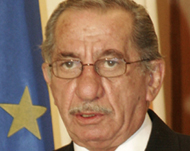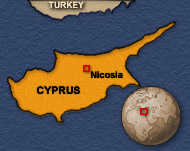Setback for Cyprus reunification plan
The victory of hardline Cypriot parties in parliamentary elections on Sunday signals that the eastern Mediterranean island is likely to remain divided.

Since the Turkish invasion in 1974, the island has in practice been divided between the southern, largely Greek Cypriot Republic of Cyprus, and the mostly Turkish Cypriot north, which is also home to some 30,000 Turkish troops.
Between the two sides runs a UN-patrolled buffer zone, which has in the past been a flashpoint for Greek-Turkish confrontation.
But back in 2004, a referendum was held on both sides of the island on a UN plan for reunification into a federal system of government, known as the Annan Plan for the mediation efforts of Kofi Annan, the UN general-secretary.
While Turkish Cypriots overwhelmingly supported the plan, more than 71% of Greek Cypriots voted against it.
Andros Kyprionou, spokesman for another ruling coalition party, the formerly communist Progressive Party of the Working People (AKEL), explains: “We voted against because the plan was not balanced and was biased in favour of the Turks.”
Greek Cypriot fears
In 2004, Tassos Papadopolous, the president, had urged Cypriots to reject the Annan plan citing that a confederative state would weaken the central government and reduce the power of the majority Greeks and afford minority Turks more leverage.
Furthermore, most Greek Cypriots felt the plan did not do enough to restore property seized from them by the Turks and Turkish Cypriots in 1974. If the referendum were to be approved, all claims they had regarding seized property would become null and void and international arbitration would cease.
 |
|
The win of Papadopoulos’ party |
They also felt the plan legitimised the presence of what they called “settler” Turks who had settled on the island since 1974.
Some Greek Cypriots also questioned why the UN plan endorsed a weapons-import embargo against Greek Cypriots but waived such restrictions when it came to Turkish forces in the north.
In the final days of campaigning for Sunday’s parliamentary elections, analysts predicted that the fallout of previous failed mediation to unify the island would weigh heavily on the electorate.
On the eve of elections, a survey by Cypriot pollsters VPRC & Public Issue showed 61% of the 18-24 age group among Greek Cypriots had given up on the idea of reunification altogether.
They said they preferred to live separately from the Turkish Cypriots. The overall figure was around 40% in favour of division.
Contentious issue
The victory of Papdopolous’ party with nearly 18% – 4% higher than in 2001 – is now seen as a de facto referendum against any future plans linked to the Annan plan and an easy entry for neighbouring Turkey into the EU.
Analysts in Cyprus believe the Annan plan proved to be a contentious issue which strengthened the campaign platforms of hardline parties.
“The main issue in the campaign has been the Annan Plan,” said commentator Vangelis Vasiliou of the daily Politis.
“The election has therefore been like a football match. On one side is the government coalition of President Papdopolous, which opposed the plan, while on the other is the opposition party, Democratic Rally (DISY), which was in favour.
 |
|
The results of Sunday’s election |
After the [2004] referendum, the whole atmosphere changed. Everybody became very negative about the Cyprus problem.”
Kyprionou believes that negotiations with Turkey will now prove challenging.
“I don’t see any possibility for the time being,” he said. “The only way they might restart is if we have a change in Turkey’s attitude.”
Many Cypriots see their large northern neighbour, Turkey, as holding the key to a future settlement. Ankara has considerable influence over the Turkish Cypriot community and is also trying to join the European Union – of which the Republic of Cyprus is already a member.
Turkey began its own accession talks to the EU last October, yet the main sticking point so far has been Papdopolous’ position that Turkey must first resolve the Cyprus problem.
Turkish factor
Under the terms of the membership talks, Turkey must open its ports and airports to Greek Cypriot vessels and aircraft, something it has so far failed to do.
“Turkey seems very unwilling to ratify the EU customs protocol under which it would have to open up like this,” says Nicholas Whyte, Europe programme director of the think-tank, International Crisis Group.
 |
|
Turkey’s 1974 invasion left the |
“The Greek Cypriots see this as very important, as they want Turkey to recognise them – it’s not so important economically, but is very important symbolically.”
At present, Turkey only recognises the Turkish Cypriot administration in the north, the Turkish Republic of Northern Cyprus. This remains unrecognised, however, by the international community.
“The Greek Cypriots will likely feel their position strengthened on the issue of recognition by the election,” Whyte said, “and push Turkey much harder.”
But for the Turkish government, recognition of the Greek Cypriots – even if partial – would be very unpopular with the electorate – and is a move the government of Recip Tayyip Erdogan has therefore been highly reluctant to take.
Whyte said: “The risk is that Turkey may, as a result of all this pushing, simply walk off and become more isolationist. This would have major implications for the security of the whole region.”